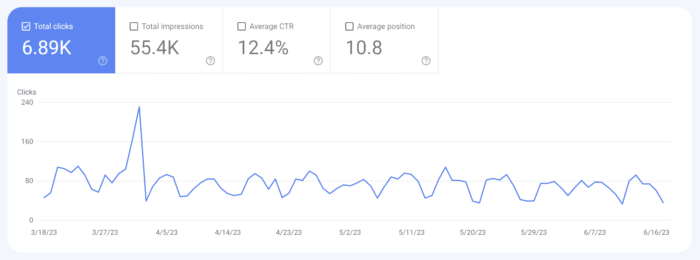
In the vast world wide web, where countless websites compete for attention, search engine optimization (SEO) is the not-so-secret for achieving online success. It’s the key to unlocking higher visibility, attracting organic traffic, and ultimately standing out amidst the virtual noise. As a web designer or developer, you understand the importance of optimizing your website to appease search engines and captivate your target audience.
But how can you refine your SEO strategies and stay ahead of the curve? Enter Google Search Console, a powerful tool that empowers webmasters and SEO professionals to uncover valuable insights, address technical issues, and fine-tune their websites for optimal performance in search engine rankings.
This article will give you an overview of Google Search Console and show you how to leverage its features to supercharge your website’s SEO potential. From analyzing performance metrics to addressing technical SEO issues, we’ll cover it all, helping you transform your website into an SEO powerhouse.
What is Google Search Console?
Google Search Console serves as an indispensable tool in the arsenal of webmasters and SEO professionals. As a free web service provided by Google, it offers a wealth of features and insights to refine your website’s SEO performance.
Purpose and Functionality:
Google Search Console is designed to provide webmasters and SEO professionals with a comprehensive understanding of how their websites are perceived by search engines. It allows you to monitor and manage various aspects of your site’s presence in search results. From indexing status to keyword performance, Google Search Console offers a holistic view of your website’s SEO health.
Key Features and Benefits:
One of the primary benefits of Google Search Console is the ability to monitor and analyze website performance in search results. It enables you to track key metrics such as impressions, clicks, and average position for specific search queries. This valuable data helps you assess the effectiveness of your SEO strategies and identify areas for improvement.
Another invaluable feature of Google Search Console is its capability to identify and fix issues that may hinder your website’s visibility. It provides alerts and notifications regarding 404 errors, sitemap issues, and mobile usability concerns. Addressing these issues promptly ensures that search engines can access and understand your website’s content effectively.
Additionally, Google Search Console offers insights into user behavior, allowing you to understand how visitors interact with your website. It provides data on CTR, user queries, and the appearance of your site’s pages in search results. Armed with this information, you can optimize meta tags, titles, and descriptions to entice users to click through to your website.
Top Features of Google Search Console

Performance Report:
This report provides a comprehensive view of how your website is performing in search results. You’ll gain insights into search queries, impressions, clicks, and average position. Dive into these metrics to uncover hidden opportunities and fine-tune your SEO strategy for maximum impact.
Keyword Optimization and Click-Through Rate:
Within the Performance Report, you can identify keyword opportunities and optimize meta tags, titles, and descriptions to improve your website’s organic CTR. With compelling and relevant meta information, you increase the likelihood of enticing users to click through to your website. This optimization not only improves your CTR but also enhances your website’s visibility in search results.
Index Coverage and Crawl Errors:
Monitoring your website’s index coverage and identifying crawl errors are crucial for ensuring that search engines properly index your web pages. Search Console provides alerts for any issues that may prevent certain pages from being indexed. By addressing crawl errors promptly, you can ensure that search engines can access and understand your website’s content effectively.
Enhancing Website Usability and Mobile-Friendliness:
User experience plays a vital role in SEO. Google Search Console offers the Mobile Usability and Core Web Vitals reports, helping you optimize your website’s usability and mobile experience. These reports provide valuable insights into mobile-friendly issues, loading performance, and interactivity.
Schema Markup and Structured Data:
Implementing schema markup and leveraging structured data can greatly enhance your website’s appearance and understanding by search engines. Google Search Console allows you to validate and test your structured data, ensuring that it follows the recommended guidelines. With structured information about your content, you increase the chances of rich snippets, knowledge panels, and other enhanced search result features, boosting your website’s visibility and click-through rates.
Backlink Analysis and Link Building:
Backlinks remain a vital aspect of SEO. Google Search Console offers a Link Report that allows you to identify and analyze the backlinks pointing to your website. Understanding the quality and quantity of your backlinks helps you assess your website’s authority and identify potential areas for improvement. Implementing effective link-building strategies, such as reaching out to relevant websites or creating valuable content, can help you acquire high-quality backlinks that strengthen your website’s SEO performance.
Addressing Technical SEO Issues
Exploring the Coverage Report:
One of the key aspects of technical SEO is addressing coverage issues within your website. Google Search Console’s Coverage report provides insights into crawl errors, URL submission, and canonicalization. It’s essential to address these issues to ensure that search engines can crawl and index your web pages effectively.
Site Speed and Performance Optimization:
Website loading speed is a critical factor in user experience and SEO. With Google Search Console’s Speed report, you can analyze your website’s performance and identify areas for improvement. Slow-loading pages can lead to higher bounce rates and lower search engine rankings. By optimizing your website’s speed, leveraging techniques such as image compression, caching, and minifying code, you create a smoother and faster browsing experience for your users, leading to improved SEO performance.
XML Sitemap Submission and Monitoring:
Submitting an XML sitemap to Google Search Console is vital for ensuring that search engines can discover and index your web pages efficiently. Google Search Console provides a convenient way to submit your XML sitemap and monitor its status. Regularly check the sitemap report to ensure that all relevant pages are included, detect any potential issues, and track the indexing status of your website. This helps you ensure that your web pages are appropriately indexed and accessible to search engine users.
Utilizing Google Search Console for SEO Insights and Reporting
Query and Page Reports:
Extracting valuable SEO insights is crucial for refining your optimization strategies. With Google Search Console’s Query and Page reports, you can dive deep into keyword performance, impressions, and click-through rates. Analyze this data to gain valuable insights into how users discover and engage with your website in search results. Understanding which keywords are driving traffic and optimizing your content accordingly empowers you to enhance your website’s relevance and visibility.
Analyzing User Behavior with Google Analytics Integration:
Integrating Google Search Console with Google Analytics provides a powerful combination of SEO and user behavior data. This integration enables you to gain deeper insights into user behavior, conversions, and engagement metrics. With the combined information from both platforms, you can identify which pages attract the most organic traffic, understand user journeys, and uncover opportunities for improving conversion rates. This integration offers a comprehensive understanding of how your SEO efforts impact user engagement and website performance.
Generating SEO Performance Reports:
Tracking the progress and impact of your SEO efforts is crucial for measuring success and making informed decisions. Google Search Console allows you to create custom SEO performance reports using its data. These reports help you track key metrics, identify trends, and evaluate the effectiveness of your optimization strategies. Regularly generate and review these reports to fine-tune your SEO approach and identify areas for improvement.
It is important to emphasize the significance of Google Search Console in refining your SEO approach. By implementing this tool, you gain valuable insights, enhance your website’s visibility, improve search engine rankings, and drive organic traffic. However, it’s crucial to remember that SEO is an ongoing process that requires continuous monitoring and adaptation. The dynamic nature of search engine algorithms necessitates staying ahead of the game. Regularly leveraging Google Search Console allows you to stay informed, identify trends, and make necessary adjustments to maintain and enhance your website’s SEO performance.

